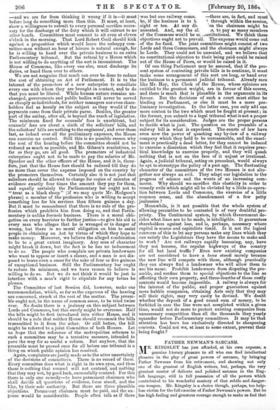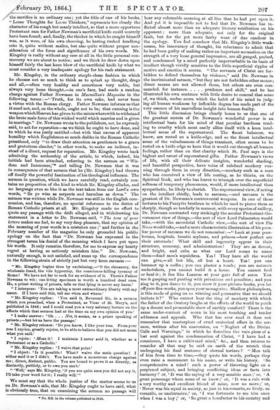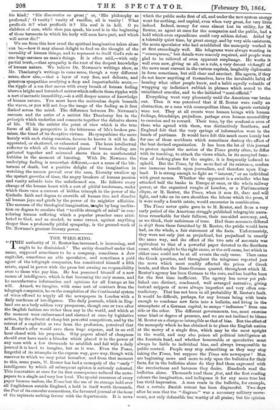FATHER NEWMAN'S SARCASM.
AIR. KINGSLEY has just afforded, at his own expense, a 1t1 genuine literary pleasure to all who can find intellectual pleasure in the play of great powers of sarcasm, by bringing Father Newman from his retirement, and showing not only one of the greatest of English writers, but, perhaps, the very greatest master of delicate and polished sarcasm in the Eng- lish language, still in full possession of all the powers which contributed to his wonderful mastery of that subtle and danger- ous weapon. Mr. Kingsley is a choice though, perhaps, too help- less victim for the full exercise of Father Newman's powers. But he has high feeling and generous courage enough to make us feel that the sacrifice is no ordinary one ; yet the title of one of his books, "Loose Thoughts for Loose Thinkers," represents too closely the character of his rough but manly intellect, so that a more opportune Protestant ram for Father Newman's sacrificial knife could scarcely have been found; and, finally, the thicket in which he caught himself was, as it were, of his own choosing, he having rushed headlong into it, quite without malice, but also quite without proper con- sideration of the force and significance of his own words. Mr. Kingsley is really without any case at all in the little personal con- troversy we are about to notice; and we think he drew down upon himself fairly the last keen blow of the sacrificial knife by what we must consider a very inadequate apology for his rash statement.
Mr. Kingsley, in the ordinary steeple-chase fashion in which he chooses not so much to think as to splash up thought, dregs and all,—often very healthy and sometimes very noble, but always very loose thought—in one's face, had made a random charge against Father Newman in Macmillan's Magazine in the following terms : —" Truth, for its own sake, had never been a virtue with the Roman clergy. Father Newman informs us that it need not, and, on the whole, ought not to be; that cunning is the weapon whichHeaven has given to the saints wherewith to withstand the brute male force of this wicked world which marries and is given in marriage." Dr. Newman wrote to the publishers, not, he expressly said, to ask for reparation—as we think he ought to have done, and to which he was justly entitled—but with that excess of apparent humility which Englishmen so much dislike in the Roman Catholic priesthood, only "to draw their attention as gentlemen to a grave and gratuitous slander," in other words, to make an indirect, in- stead of a direct, request for reparation. Mr. Kingsley wrote back admitting the authorship of the article, to which, indeed, his initials had been attached, referring to the sermon on "Wis- dom and Innocence,"* and telling Dr. Newman that it was in consequence of that sermon that he (Mr. Kingsley) had thrown off finally the powerful fascination of his theological influence. The sermon in question, which we have carefully read, certainly con- tains no proposition of the kind to which Mr. Kingsley alludes, and no language even so like it as the text taken from our Lord's own words, "Be ye wise as serpents and harmless as doves." The sermon was written while Dr. Newman was still in the-English com- munion, and has, therefore, no special reference to the duties of Roman Catholic priests at all. Mr. Kingsley made no effort to quote any passage with the drift alleged, and in withdrawing his statement in a letter to Dr. Newman said, "The tone of your letters makes me feel, to my very deep pleasure, that my opinion of the meaning of your words is a mistaken one ;" and further in the February number of the magazine he only grounded his public apology on the fact that "Dr. Newman has expressed in the strongest terms his denial of the meaning which I have put upon his words. It only remains, therefore, for me to express my hearty regret at having so seriously mistaken him." Dr. Newman, naturally enough, is not satisfied, and BUMS up the correspondence in the following strain of strictly just but very keen sarcasm :— " Mr. Kin,geley begins then by exclaiming,—' 0 the chicanery, the wholesale fraud, the vile hypocrisy, the conscience-killing tyranny of Rome! We have not far to seek for an evidence of it. There's Father Newman to wit : one living specimen is worth a hundred dead ones. He, a priest writing of priests, tells us that lying is never any harm.'
"I interpose: 'Yon are takings most extraordinary liberty with my name. If I have said this, tell me when and where.'
"Mr. Kingsley replies : You said it, Reverend Sir, in a sermon which you preached, when a Protestant, as Vicar of St. Mary's, and published in 1844; and I could read you a very salutary lecture on the effects which that sermon had at the time on my own opinion of you.'
" I make answer Oh . . . Not, it seems, as a priest speaking of priests ;—but lotus have the passage.'
"Mr. Kingsley relaxes: Do you know, I like your tone. From your tone I rejoice, greatly rejoice, to be able to believe that you did not mean what you said.'
"I rejoin : Mean it! I maintain I never said it, whether ass Protestant or as a Catholic.'
"Mr. Kingsley replies : I waive that point.'
"I object: 'Is it possible! What ? waive the main question! I either said it or I didn't. You have made a monstrous charge against me ; direct, distinct, public. You are bound to prove it as directly, as distinctly, publicly, or to own you can't.'
"'Well,' says Mr. Kingsley, if you are quite sure you did not say it, III take your word for it ; I really will.'"
We must say that the whole justice of the matter seems to us on Dr. Newman's side, that Mr. Kingsley ought to have said, what is obviously true, that on eTamieing the sermon no passage will
* No. XX. in the Tolume published in 1814.
bear any colourable meaning at all like that he had put upon it. And yet it is impossible not to feel that Dr. Newman has in- fficted almost more than an adequate literary retribution on his opponent ; more than adequate, not only for the original fault, but for the yet more faulty want of due candour in the apology. You feel somehow that Mr. Kingsley's little weak- nesses, his inaccuracy of thought, his reluctance to admit that he had been guilty of making rather an important accusation on the strength of a very loose general impression, are all gauged, probed, and condemned by a mind perfectly imperturbable in its basis of intellect though vividly sensitive to the little superficial ripples of motive and emotion it scorns. "The servants of Christ are for- bidden to defend themselves by violence," said Dr. Newman in the incriminated sermon, "but they are not forbidden other means; direct means are not allowed them, but others are even com- manded, for instance prudence and skill," and he has illustrated his own sentence with little desire to conceal that sense of, we think, undue scorn which the habit of his mind in judg- ing all human weakness by inflexible dogma has made part of the very essence of his marvellous insight into human frailty.
This little discussion brings clearly home to us that one of the greatest secrets of Dr. Newman's wonderful power is an intellectual basis for his mind of that peculiar hardness tend- ing to cruelty which most easily allies itself with a keen intel- lectual sense of the supernatural. The finest balances, we know, are rested on a knife-edge, and so the finest intellectual- sense of the valuelessness of things transient, often seems to be rested on a knife-edge so keen that it would cut through all human feelings, rather than on that charity which St. Paul says is the highest and rarest of supernatural gifts. Father Newman's views of life, with all their delicate insights, wonderful shading, and beautiful perspective, have veins of subdued mockery run- ning through them in every direction,—mockery such as a man who has conceived a view of life resting, as he thinks, on the Spiritual Rock, and who has learnt to triumph over the superficial softness of temporary phenomena, would, if more intellectual than sympathetic, be likely to cherish. The supernatural view, if acting on the intellect chiefly, leads to sarcasm,—and sarcasm is the greatest of Dr. Newman's controversial weapons. In one of those lectures to his Puseyite brethren in which he used to pierce them so sharply, though so tenderly in manner, with every species of raillery, Dr. Newman contrasted very strikingly the secular Protestant-Go- vernment view of things,—the sort of view Lord Palmerston would take,—with the sacerdotal Catholic view,—the sort of view Pie Nouo would take,—and a more characteristic illustration of his peon. liar power of sarcasm we do not remember:—" Look at your poor- houses, hospitals, lunatic asylums, and prisons—how perfect are their externals 1 What skill and ingenuity appear in their structure, economy, and administration! They are as decent, and bright, and calm as what our Lord seems to name them—dead men's sepulchres. Yes They have all the world can give,—all but life, all but a heart. Yes you can hammer up a coffin; you can plaster a tomb ; you are nature's undertakers, you cannot build it a home. You cannot feed or heal it ; it lies like Lazarus at your gate full of sores. You see it gasping and panting with privations and penalties ; and you sing to it, you dance to it, you show it your picture-books, you let off your fire-works, you open your menageries. Shallow philosophers, is this mode of going on so winning and persuasive that we should imitate it ?" Who cannot hear the ring of mockery with which the father of the Oratory laughs at the efforts of the world to patch up a decent and presentable show of earthly comfort? There is the same under-current of scorn in his most touching and tender addresses and appeals. Who that has ever read it does not remember that masterpiece of cruel oratorical effect in the ser- mon, written after his conversion, on "Neglect of the Divine Calls and Warnings," in which he describes the vain pleas of a lost soul against the condemnation of Christ, "I have had a conscience, I have a cultivated mind," &c., and then returns to consider all that may be said on earth of the wretch thus undergoing his final sentence of eternal torture ? "Men talk of him from time to time,—they quote his words, perhaps they even raise a monument to his name, or write his history. So comprehensive a mind ! such a power of throwing light on a perplexed subject, and bringing conflicting ideas or facts into harmony!' or, 'It was the saying of a very sensible man ;' or, A great personage whom some of us knew ;' or, 'It was a rule with a very worthy and excellent friend of mine, now no more ;' or, Never was his equal in society, so just in his remarks, so lively, so versatile, so unobtrusive;' or, 'I was fortunate to see him once when I was a boy ;' or, 'So great a binefactor to his country and his kind;' His discoveries so great i' or, 'His philosophy so profound ;' 0 vanity! vanity of vanines, all is vanity ! What profiteth it? what profiteth it ? His soul is in hell. 0 ye children of men, while thus yon speak, his soul is in the beginning of those torments in which his body will soon have part, and which will never die !"
We see from this how cruel the spiritual imagination taken alone can be,—how it may almost delight to feed on the thought of the unreality of human things, and to represent to itself God's rule as one huge sarcasm on man's doings. It is often said,—with only partial truth,—that sympathy is the root of the deepest knowledge of human nature. We believe Dr. Newman's writings show, as Mr. Thackeray's writings in some sense, though a very different . sense, show also,—that a layer of very fine, and delicate, and generous sympathies overlying a deep and imperturbable scorn,— the ripple of a sea that moves with every breath of human feeling above a bright and burnished mirror which reflects these ripples with a sort of sarcastic immobility,—is a still deeper source of knowledge of human nature. You mast have the motionless depth beneath the waves, or you will not keep the image of the feeling as it first flashed across the mind. The difference between Dr. Newman's sarcasm and the satire of a satirist like Thackeray lies in the principle which underlies and connects together the delusive shows of life. With the satirist the point of view which is the true focus of all his perspective is the bitterness of life's broken pro- mises, the tinsel of its deceptive virtues. He sympathizes the more keenly with each rising emotion, because he knows it will be dis- appointed, or shattered, or exhausted soon. The keen intellectual reflector in which all the transient phases of human feeling are gathered together and mirrored shows them as unsubstantial bubbles in the moment of bursting. With Dr. Newman the underlying feeling is somewhat different,—not a sense of the bit- terness of death, but a positive delight of the imagination in watching the unseen prevail over the seen, Eternity swallow up the upstart growths of time, the angry breakers of human passion and vanity subside into the unfathomed sea. He follows every -change of the human heart with a sort of pitiful tenderness, under which there runs a current of hidden triumph in the power of the Catholic faith and dogma to override all human ties, and dissolve all human joys and griefs by the power of its mightier affinities. The sarcasm of the theological imagination, taught by long medita- tion on dogma to emulate that "terrible strength of mind" in con- sidering human suffering which a popular preacher once attri- buted to God, and so steeled, to some extent, against anything deeper than a profoundly pitiful sympathy, is the ground-work of Dr. Newman's greatest literary power.
































 Previous page
Previous page